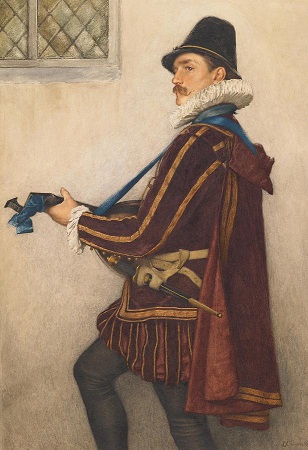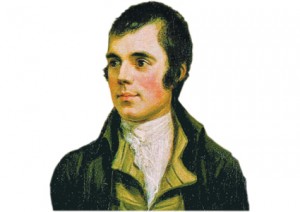
Davide Rizzio (Rizzo/Riccio) known in Scotland as David Rizzio (around 1533-1566), probably born in Pancalieri in the province of Turin, was court musician and favourite chamberlain of Queen Mary Stuart.
The handsome Davide (although the detractors describe him as ugly, small and hunchbacked) was at the service of the House of Savoy and went to Scotland in 1561 following the Turin delegation; he liked it so much (some insinuate that he was a Catholic spy), that he managed to enter the service of the Queen, for his talents as a musician and an excellent singer. (1)
Initially he was also a friend of Lord Darnley (Henry Stuart, grandson of Henry VIII) who tried to ingratiate himself with him to enter the Queen’s favor.
Once the Queen was married, however, the royal consort turned out to be not up to expectations and Queen Mary on the one hand removed him from his bed and state affairs by denying him the matrimonial crown, and on the other she became increasingly tied to Rizzio appointed in the meantime, his secretary.
Soon the friendship between David and the king was also broken (2) and Rizzio was accused of high treason (as alleged lover of the Queen as well as presumed father of the unborn child): but the conspirators did not bother to prove the accusation and went directly to the murder.

In killing Rizzio, the Queen’s authority was in fact undermined: the conspirators led by Darnley entered the queen’s private dining room who was entertaining dinner with some guests.
In the struggle, the queen was held back by Darnley himself while David was hit about fifty times.
Mary was in the sixth month of pregnancy.
A death that cried revenge and Lord Darnley was assassinated just the year after the death of his rival. The gossip behind all this murky affair is that James VI (the future king of Scotland and England) could be of Piedmontese blood!
AULD ROB MORRIS by David Rizzio
Among the seven tunes attributed to Riccio by William Thompson in “Orpheus Caledonius”, one is Auld Rob Morris (or Auld Bob Morrice) even if in the second edition of “Orpheus Caledonius” this attribution was omitted.
The original text version reported by Allan Ramsay and attributed to David Rizzio derives from a collection of ancient arias printed in 1692 (The Blaikie Manuscript) belonging to William Blaikie, compiled by Andrew Adam together with the tablature for lyra viol. (3)
is a contrast between a mother and her daughter about a too old suitor!
Let’s listen to the melody in Sylvain Bargeron’s performance (first piece of the suite)
In this first text entitled ‘Jock the Laird’s Brither’ [Jock the laird’s brother], partially rewritten by Allan Ramsay and published under the title Auld Rob Morris, it is a contrast between mother and daughter regarding a pretender a little too much old!
Mother:
There’s auld rob Morris that win’s in yon glen,
He’s the king of good fellows and wyle of auld men.
Has fourscore of black sheep, and fourscore too,
Auld rob Morris is the man you maun loo.
Daughter:
Oh had your tongue, mother, and let that abee,
For his eild and my eild will never agree:
Thei’ll never agree, and that will be seen
For he is fourscore, and I’m but fifteen.
Mother:
Then had your tongue, daughter, and lay by your pride,
For he’s be the bridegroom, and ye’s be the bride;
He shall lye your side, and kiss you too,
And auld rob Morris is the man you may loo.
Daughter:
But auld rob Morris I never will hae,
His back is so stiff, and his beard is grown gray;
I had rather die than live with him a year,
Sae mair of rob Morris I never will hear.
We find the arrangement of the melody made by another Italian composer Francesco Geminiani (Lucca 1687 – Dublin 1762).
Robert Burns version
Robert Burns rewrites the text in 1792 starting from the first verses reported in Tea Table Miscellany and attributed to David Riccio; the song had a fair fortune with the German title of “Der alte Rob Morris”, Max Bruch arranged a classic version in “Zwölf schottische Volkslieder” (Twelve Scottish folk songs, 1863).
The situation imagined by Burns is a love affair between an old man (auld is actually an adjective that is used indiscriminately in the Scottish dialect, without necessarily corresponding to an advanced age), but wealthy local lord – Auld Rob Morris- and a young man beautiful, but without substances; they vie for the heart of a lady of the upper class (there is no hope for the young man!)
I
There’s Auld Rob Morris that wons (i) in yon glen,
He’s the King o’ gude fellows, and wale (ii) o’ auld men;
He has gowd (iii) in his coffers, he has owsen and kine (iv),
And ae bonie lass, his dautie and mine.
II
She’s fresh as the morning, the fairest in May;
She’s sweet as the ev’ning amang the new hay;
As blythe and as artless as the lambs on the lea,
And dear to my heart as the light to my e’e.
III
But oh! she’s an Heiress, auld Robin’s a laird (v),
And my daddie has nought but a cot-house (vi) and yard;
A wooer like me maunna (vii) hope to come speed,
The wounds (viii) I must hide that will soon be my dead.
IV
The day comes to me, but delight brings me nane;
The night comes to me, but my rest it is gane;
I wander my lane l ike a night-troubled ghaist,
And I sigh as my heart it wad burst in my breast.
V
O had she but been of a lower degree,
I then might hae hop’d she wad smil’d upon me!
O how past descriving had then been my bliss,
As now my distraction nae words can express.
SOURCES
(1) http://www.kultunderground.org/art/305
(2) see another scandal related to the ballad “The four Maries“
(3) “This tune can be found in the Leyden manuscript, written in Lyra-viol tablature, which probably dates from the 1690s. It can also be found in one of the Blaikie manuscripts in Viol de Gamba tablature dated 1692, under the name “Jock the Laird’s Brother”.Later it was published in The Orpheus Caledonius (1725), Watt’s Musical Miscellany (1730) and Craig’s Select Scottish Tunes (1730). Words existed to the tune, published in Allan Ramsay’s Tea Table Miscellany (1724)” https://thesession.org/tunes/9928; http://tunearch.org/wiki/Auld_Rob_Morris
(4) http://www.burnsscotland.com/items/v/volume-ii,-song-192,-page-200-auld-rob-morris.aspx
(5) http://www.robertburnsfederation.com/poems/translations/auld_rob_morris.htm
(6) http://www.lieder.net/lieder/get_text.html?TextId=106017

